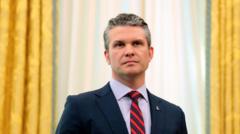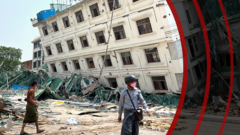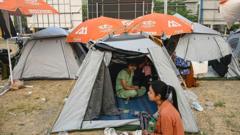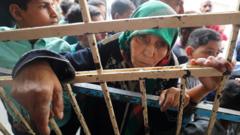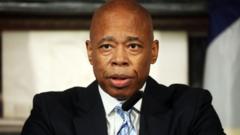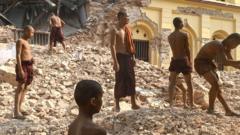In the aftermath of the Myanmar earthquake, Secretary of State Marco Rubio defends the US's limited response, attributing it to a shift in priorities and emphasizing that other wealthy countries should contribute more to humanitarian efforts. Former USAID officials have criticized the dismantling of the agency as a hinderance to immediate disaster response.
Rubio Responds to Criticism Over US Aid Shortfalls in Myanmar Earthquake
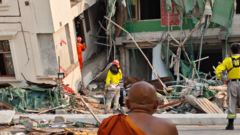
Rubio Responds to Criticism Over US Aid Shortfalls in Myanmar Earthquake
US Secretary of State Marco Rubio brushes off accusations related to the inadequate US response to the devastating earthquake in Myanmar, citing other priorities and the responsibilities of wealthier nations.
US Secretary of State Marco Rubio has come under fire for the United States’ limited response to the devastating earthquake in Myanmar, which has claimed over 3,000 lives. Responding to accusations that the Trump administration’s cuts to humanitarian aid capabilities stifled US involvement, Rubio stated, "we are not the government of the world."
Critics point out that the cessation of operations at the United States Agency for International Development (USAID) left the country ill-prepared to deploy rescue teams and resources. Former USAID officials indicated that the inability to mobilize rescuers and equipment in the aftermath of the March 28 quake was a direct result of the dismantling of the agency during the prior administration.
At a NATO meeting in Brussels, Rubio stressed the need for the US to balance humanitarian efforts with its national interests and "other priorities." He further noted that it is not solely the responsibility of the US to respond to global disasters, stating, "There are a lot of other rich countries in the world, they should all be pitching in."
Despite calls for increased American support, Rubio claimed that access to Myanmar poses challenges due to its military regime, which has historically been resistant to outside intervention. Although the State Department identified a formal request for assistance from Myanmar, former officials insist that prior USAID operations had effectively bypassed political hostility in other nations.
Rubio rebuffed claims that budget cuts to USAID were responsible for the limited response, suggesting that various non-governmental organizations (NGOs) are overly reliant on US funding while asserting that the US is ready to assist local governments and effective NGOs in delivering aid.
Amid discussions surrounding the US's humanitarian role, former officials highlighted that the White House’s attempts to deploy a Disaster Assistance Response Team (DART) were thwarted due to cuts leading to the cancellation of essential logistics contracts and staff layoffs at USAID.
With competing countries like China and India already deploying teams to Myanmar, the urgency for the US to revamp its approach to international aid amidst disaster situations continues to grow.



